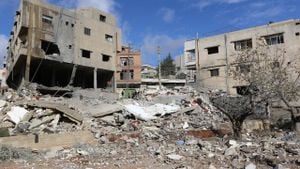Lebanese civilians who had fled their homes amid intensifying violence and bombings have started returning following the announcement of a ceasefire between Israel and Hezbollah. This ceasefire came as a relief to many, marking the first significant pause after what has been described as some of the most severe Israeli airstrikes during nearly 14 months of conflict.
Early on Wednesday, at approximately 4 AM local time, the ceasefire took effect, allowing thousands of displaced residents from southern Lebanon access to their homes again. The sight of cars streaming back to areas such as Beirut's southern suburbs, known as Dahiyeh, highlighted the longing for normalcy among the populace. Social media showcased videos of civilians, filled with anticipation, heading back to neighborhoods heavily affected by Israeli airstrikes.
Officials estimated around 1.3 million Lebanese people had been displaced due to the conflict before the ceasefire was enforced. Yet, uncertainty looms over the truce's longevity, as Israeli officials have cautioned they would respond militarily if Hezbollah violated the ceasefire.
Meanwhile, as Lebanese residents grapple with returning and rebuilding their lives, Gaza continues to face rampant violence. Reports reveal pressures from both the Israeli military and humanitarian groups. While the ceasefire holds some promise of respite for Lebanon, it coincides with continued airstrikes on Gaza, where civilian casualties have rapidly risen.
The toll from Israel's military operations has been staggering. The Palestinian health ministry reported over 44,000 Palestinian deaths since October 7, 2023, with more than 104,900 injuries. Recent strikes reported at least nine fatalities, underscoring the relentless nature of the assaults on the Gaza Strip.
Israeli officials have been vocal about their military objectives, disregarding any potential ceasefire discussions concerning Gaza, even as they aim for Hamas militants operating from the region. A Hamas official indicated readiness for talks concerning ceasefire agreements, hoping for serious conversations on prisoner exchanges with borders like Egypt, Turkey, and Qatar acting as mediators.
Israeli airstrikes have continued indiscriminately, targeting locations like schools and shelters—places where civilians often congregate for safety. Late on Wednesday, Israeli bombs hit areas deemed safe by many, tragically leading to civilian casualties, including women and children.
The intensity of the situation becomes more palpable when contrasting the experiences of civilians returning to Lebanon against those remaining vulnerable to violence and siege conditions within Gaza. This stark discrepancy raises questions about the prevailing state of affairs and the slide back to conflict after what many hoped could be viewed as temporary relief.
Hezbollah has also issued statements expressing its readiness to support Palestinian factions amid the continued aggression from Israel. The group's operatives reaffirmed their commitment to opposing Israeli military actions, reflecting the solidarity they feel with those suffering the brunt of the violence.
Nonetheless, the mounting pressure for humanitarian aid grows, as the population still confronts significant shortages of food, water, and medical supplies. Local charities hope to assist as aid from international communities slowly trickles through borders.
The broader regional dynamics complicate the already intense situation. Israeli politicians have signaled they may negotiate with Hezbollah but have shown reluctance to normalize relations or fully address grievances raised since the start of the conflict. The prospect of renewed talks creates apprehension as tensions remain high.
Countries and organizations watching the situation include major global players. For example, the British government remains engaged with Israeli Prime Minister Netanyahu even after the issuance of arrest warrants for war crimes during actions taken against Gaza. British Foreign Minister David Lammy stated he would comply with requests from the International Criminal Court but emphasized the importance of dialogue with Israel concerning the ceasefire and humanitarian efforts.
Despite the growing concern for the humanitarian crises facing both Lebanon and Palestine, territorial disputes and military retaliations over the upcoming days remain pressing issues. For now, as the ceasefire holds, it grants short-term respite—yet peace remains fragile.
This complex interplay of conflict and humanitarian challenges highlights the urgent need for diplomatic solutions, emphasizing both the local sorrows and the broader geopolitical struggles as powers vie for solutions to this long-standing crisis.



